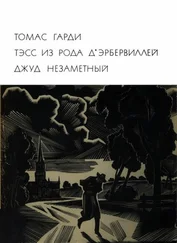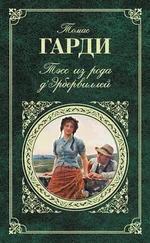| She bade her acquaintance goodbye-for the respective carters had now come out from the inn-and the two waggons resumed their journey in opposite directions; the vehicle whereon sat Marian, Izz, and the ploughman's family with whom they had thrown in their lot, being brightly painted, and drawn by three powerful horses with shining brass ornaments on their harness; while the waggon on which Mrs Durbeyfield and her family rode was a creaking erection that would scarcely bear the weight of the superincumbent load; one which had known no paint since it was made, and drawn by two horses only. |
Она распрощалась со своими товарками, так как возницы вышли из харчевни, и обе подводы разъехались в разные стороны. Подвода, на которой сидели Мэриэн, Изз и семья крестьянина - с этой семьей они связали свою судьбу, - была выкрашена яркой краской, и тащили ее три сильные лошади с блестящими медными украшениями на сбруе, тогда как скрипучая подвода Дарбейфилдов едва выдерживала тяжесть поклажи; краска слезла с нее давным-давно, а тащили ее только две лошади. |
| The contrast well marked the difference between being fetched by a thriving farmer and conveying oneself whither no hirer waited one's coming. |
Контраст этот красноречиво свидетельствовал о том, что за первой семьей прислал подводу преуспевающий фермер, а вторая перебиралась за свой счет, и никто не ждал ее прибытия. |
| The distance was great-too great for a day's journey-and it was with the utmost difficulty that the horses performed it. |
Путь был дальний, такой дальний, что под конец лошади еле шли шагом. |
| Though they had started so early, it was quite late in the afternoon when they turned the flank of an eminence which formed part of the upland called Greenhill. |
Хотя выехали они рано, но уже смеркалось, когда они добрались до возвышенности, составлявшей часть плоскогорья Гринхилл. |
| While the horses stood to stale and breathe themselves Tess looked around. |
Пока лошади отдыхали, Тэсс осматривалась по сторонам. |
| Under the hill, and just ahead of them, was the half-dead townlet of their pilgrimage, Kingsbere, where lay those ancestors of whom her father had spoken and sung to painfulness: Kingsbere, the spot of all spots in the world which could be considered the d'Urbervilles' home, since they had resided there for full five hundred years. |
Впереди, у подножия холма, виднелся почти вымерший городишко - цель их паломничества -Кингсбир, где покоились предки, служившие ее отцу неиссякаемой темой для разговоров, -Кингсбир, единственное место на земном шаре, которое поистине могло считаться родным домом д'Эрбервиллей, ибо они обитали здесь в течение целых пятисот лет. |
| A man could be seen advancing from the outskirts towards them, and when he beheld the nature of their waggon-load he quickened his steps. |
Из предместья вышел какой-то человек; разглядев нагруженную подводу, он ускорил шаги. |
| "You be the woman they call Mrs Durbeyfield, I reckon?" he said to Tess's mother, who had descended to walk the remainder of the way. |
- Вы не будете миссис Дарбейфилд? - обратился он к матери Тэсс, которая слезла с воза, чтобы дальше идти пешком. |
| She nodded. |
Та кивнула. |
| "Though widow of the late Sir John d'Urberville, poor nobleman, if I cared for my rights; and returning to the domain of his forefathers." |
- Если б вздумалось мне отстаивать свое право, я бы могла называться вдовой сэра Джона д'Эрбервилля, бедного дворянина. Я возвращаюсь во владения его предков. |
| "Oh? |
-Да? |
| Well, I know nothing about that; but if you be Mrs Durbeyfield, I am sent to tell 'ee that the rooms you wanted be let. |
Ну, этого я не знаю. Но если вы миссис Дарбейфилд, то меня послали вам сказать, что комнаты, которые вы хотели занять, сданы. |
| We didn't know that you was coming till we got your letter this morning-when 'twas too late. |
Мы не знали, что вы приедете, пока не получили ваше письмо сегодня утром, когда было уже поздно. |
| But no doubt you can get other lodgings somewhere." |
Но вы найдете комнаты где-нибудь в другом месте. |
| The man had noticed the face of Tess, which had become ash-pale at his intelligence. |
Он заметил, что лицо Тэсс стало землисто-бледным. |
| Her mother looked hopelessly at fault. |
Мать ее окончательно растерялась. |
| "What shall we do now, Tess?" she said bitterly. |
- Что же нам теперь делать, Тэсс? - с горечью спросила она. |
| "Here's a welcome to your ancestors' lands! |
- Вот тебе и владения предков! |
| However, let's try further." |
Ну, все равно, поедем дальше. |
| They moved on into the town, and tried with all their might, Tess remaining with the waggon to take care of the children whilst her mother and 'Liza-Lu made inquiries. |
Они въехали в город и принялись за поиски. Тэсс осталась у подводы присматривать за детьми, а мать и Лиза Лу наводили справки. |
| At the last return of Joan to the vehicle, an hour later, when her search for accommodation had still been fruitless, the driver of the waggon said the goods must be unloaded, as the horses were half-dead, and he was bound to return part of the way at least that night. |
Через час Джоан вернулась после бесплодных поисков, и тут возница объявил, что подводу нужно разгрузить, так как лошади совсем выбились из сил, а ему надо выехать в обратный путь еще до рассвета. |
| "Very well-unload it here," said Joan recklessly. |
- Ладно, разгружайте здесь, - не задумываясь, ответила Джоан. |
| "I'll get shelter somewhere." |
- Где-нибудь я найду пристанище. |
| The waggon had drawn up under the churchyard wall, in a spot screened from view, and the driver, nothing loth, soon hauled down the poor heap of household goods. |
Подвода стояла у кладбищенской ограды, в стороне от дороги, и возница поспешил выгрузить жалкий домашний скарб. |
| This done, she paid him, reducing herself to almost her last shilling thereby, and he moved off and left them, only too glad to get out of further dealings with such a family. |
Когда он покончил с этим делом, она расплатилась с ним, отдав чуть ли не последний шиллинг, и он уехал, радуясь, что распрощался с такой семейкой. |
| It was a dry night, and he guessed that they would come to no harm. |
Дождя не было, и, по его мнению, ничего худого с ними не могло случиться. |
| Tess gazed desperately at the pile of furniture. |
Тэсс уныло смотрела на сваленные в кучу вещи. |
| The cold sunlight of this spring evening peered invidiously upon the crocks and kettles, upon the bunches of dried herbs shivering in the breeze, upon the brass handles of the dresser, upon the wicker-cradle they had all been rocked in, and upon the well-rubbed clock-case, all of which gave out the reproachful gleam of indoor articles abandoned to the vicissitudes of a roofless exposure for which they were never made. |
Холодные лучи заходящего солнца брезгливо скользили по глиняной посуде и котелкам, по пучкам сухих трав, трепетавших на ветру, по медным ручкам кухонного шкафа, по плетеной колыбели, в которой перебывали все дети Дарбейфилдов, и по отполированному футляру стенных часов. Всем этим вещам полагалось находиться под крышей, и сейчас они словно укоряли за то, что их бросили под открытым небом, подвергая превратностям погоды. |

![Томас Вулф - Взгляни на дом свой, ангел [английский и русский параллельные тексты]](/books/32195/tomas-vulf-vzglyani-na-dom-svoj-angel-anglijskij-thumb.webp)
![Агата Кристи - На краю [английский и русский параллельные тексты]](/books/32247/agata-kristi-na-krayu-anglijskij-i-russkij-paralle-thumb.webp)
![Сакс Ромер - Ведьмино отродье [английский и русский параллельные тексты]](/books/33237/saks-romer-vedmino-otrode-anglijskij-i-russkij-thumb.webp)
![Агата Кристи - Объявлено убийство [английский и русский параллельные тексты]](/books/33247/agata-kristi-obyavleno-ubijstvo-anglijskij-i-russ-thumb.webp)
![Фрэнсис Фицджеральд - По эту сторону рая [английский и русский параллельные тексты]](/books/34130/frensis-ficdzherald-po-etu-storonu-raya-anglijskij-thumb.webp)

